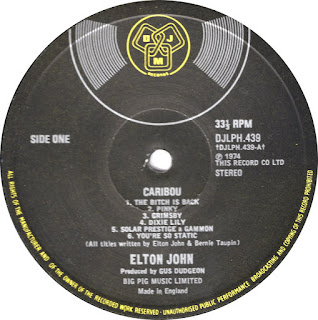“Solar Prestige a Gammon” begins in the manner of a lament, but all is not as it seems: “Oh ma cameo molesting / Kee pa a poorer for tea…” The lyrics, by John’s songwriting partner Bernie Taupin, are sung in a cod-Italian fashion, but are comprised of seemingly random English words. “Cod” is the operative word: “turbert,” “salmon,” “hair ring,” “sardin,” “floundin,” and even “cod” are words used by Taupin, along with “molassis” and “gammon” for those made hungry by the references to fish. The chorus is a shift to a jauntier tome, the lament left behind, because life carries on: “Solar prestige a gammon / Kool kar kyrie kay salmon…” Que sera, sera…
Clearly, the lyrics in this song are supposed to be nonsense, but it is inspired nonsense. John has previously said the initial idea for “Solar Prestige a Gammon” came from the Long Medley on side B of The Beatles’ album “Abbey Road,” most notably John Lennon’s “Sun King”: “Mundo paparazzi mi amore cicce verdi parasol” - in turn, “Sun King” was inspired by Fleetwood Mac’s “Albatross.” The quote from John reads, “I thought it could be great to write a song with English words that didn’t mean a thing, but that sounded fantastic when put together.” It has also been said that the deliberate avoidance of meaning was due to people having read things in Taupin’s previous lyrics that may not have been intentional, like “Madman Across the Water” being about Richard Nixon, religious references in “Border Song” and “Take Me to the Pilot,” and “Grey Seal” being about nothing in particular.
Everything I thought I did hear in “Solar Prestige a Gammon” is an example of the pareidolia I have examined previously [link] – just like you look for faces in inanimate objects, you hear for patterns in music and speech, which have created the system of scales and chords found in Western music, and where the joke surrounding rock bands like Status Quo is there are only three chords, and you know when they are going to appear. Does this mean that any attempt that writing something that is deliberately nonsense is doomed to be made sense of by the next person to come into contact with it? Possibly, so long as there was a reason to do it.




No comments:
Post a Comment